by Alex Dueben
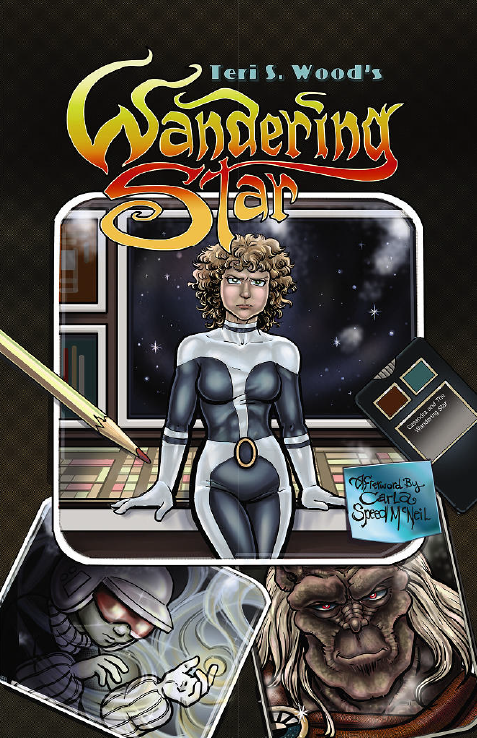
Wood laid the groundwork for this shift in tone, framing each chapter with an older Casandra telling her story to a writer who has sought her out. One reason the book changes tone is that Wood pulls no punches in her depiction of war, changing everything for both the characters and the universe they inhabit. If Wood refuses to sugarcoat any aspect of the war and its toll, she also refuses to make a story without hope.
Wood spoke about the book, how time has changed the way she thinks about its themes, what it was like making independent comics back in the 1990’s–before and after the boom–and what it means to live in Forks, Washington, a town overrun by both Bigfoot and Twilight obsessives.
Alex Dueben: You mentioned in the book’s introduction that you were just a few years out of high school when you started Wandering Star. What was your background? Had you always been making comics?
Teri Wood: Yes–that’s the short answer. The longer one is I had been scribbling comic strips and stories for as long as I can remember. When I was four, I tried drawing an epic story of the battle between a cat and a mouse, which I suspect was neither well drawn, nor well scripted, but I put my all into it. After that, I always was drawing on something.
Later, as a teen, I was obsessed with all things Star Trek–this was the late 70s/early 80s–and while searching for something to read, I found a book called Startoons, filled with some of the best cartoons from the Star Wars/Star Trek Fandoms. In it, I discovered Phil Folgio’s fan cartoon work. I loved it. I wanted to be just like him. So I joined a fan club—The Star Fleet Academy—and began doing comic strips, and one, comic parody story for their fanzine. For what it’s worth, that’s when I started doing the dots. The dots seem to have stuck.
Soon after, I found the Pini’s Elfquest, and the world changed. I’d been an avid reader of comics—Batman, Superman, House of Horror, Heavy Metal, and even Archie—but I had never encountered a long, complicated story in comics before. And I was blown away. They had created something powerful, and unforgettable. I spent hours studying scenes in the book, to understand how they did it. And I think, in some ways, Elfquest created in me the potential to do Wandering Star.
Dueben: What was the impetus for the comic, both in terms of doing a long form project and this space opera?
Wood: Elfquest was the seed, as I said. And also in 1986, I’d recently found, and devoured, Watchman, Alan Moore’s Swamp Thing, and Frank Miller’s Daredevil. Plus, I was a Star Trek fan. Which made quite a stew in my brain, when mixed with some very hard experiences from my childhood, and teen years.
What boiled up out of that was a need to tell a story, something that expressed many of the feelings I’d struggled with, and things I’d learned. And so, I started writing it in 1987, put out the first, small press book in 1988, stopped to do Rhudiprrt: The Prince of Fur for a while, then returned to it in 1992. And May 1993, Wandering Star Book One “of Twelve” came out in the stores.
Dueben: The first few issues you self-published through Pen and Ink Comics and then later the book was published by the small comics publisher Sirius, do I have that right?
Wood: Yes. I was originally one of those 1990’s, Independent creators, inspired by Bone and Cerebus. That had been my plan, to stick with self-publishing, until the big, comic book crash of 1995 hit. So many stores and distributors went under, unable to pay for the books they’d ordered, and suddenly, I had no way to pay my print costs. I was thousands of dollars in debt. Wandering Star almost died right there. It was pretty scary.
I did manage to raise the money for my next printing, and was limping forward, but looking around at the industry, things were still far from secure. I mentioned my worries to fellow creator Drew Hayes (Poison Elves) one day on the phone, and he suggested I move my book to Sirius Entertainment. I thought about it a few days, and decided the security of a bigger company might be exactly what my book needed to survive. And so, I moved.
Dueben: I had never read the original run of the series and so I was really struck by how you framed the story. A journalist has come to the main character to ask her to relate the book from her perspective. You clearly had this somber tone from the beginning.
Wood: I certainly did. I had the entire story plotted out from the beginning, with pages and pages of additional notes on the characters, and the impact the war would have on each of them. I also made sure that my original ads implied “not a happy tale”, so people would know what they were getting into, and not expect something light and silly like my work on The Cartoonist for Amazing Heroes Magazine.
But I still got some negative feedback after the war started in book four. I remember one fellow at the San Diego Comic-con emphatically insisting that I was making a terrible mistake to make the story dark, that humor was my strong suit, and I should stick with that. But I knew what I wanted to do with Wandering Star, and I kept to my notes, and I am so glad that I did.
Dueben: You may have had a story to tell, but when you started killing characters and destroying planets, were you nervous about making that shift?
Wood: Oh yes. Particularly since I really hate it when other authors kill off their characters. I haven’t even tried to watch Game of Thrones because I have heard that they keep killing people off, and I can’t stand that! Which I imagine sounds kinda awful, considering how quick with the knife I was in Wandering Star. I mean, look what I did to the Earth! But it had to happen. Wars don’t come without loss.
But yeah, I did wonder if I’d suddenly lose my entire audience. Instead, I started getting letters from people who’d been through terrible losses themselves, who said this scene, or that scene in Wandering Star, helped them through it. That ultimately, made it worth while.
Dueben: Now it was originally going to be 12 issues and it ended up running 21. What changed?
Wood: Nothing changed, beyond that I had never tried to write a long story before. And, in defense of that “twelve issue, limited series”, Wandering Star did stay mostly to script, prior to book five.
Book five was the turning point. That’s when I, the writer, lost control, and the characters started writing in stuff I hadn’t previously imagined, but seemed vital to the story once I had them in my head. As an example, the scene of Casi and Joey in the rain—a scene I got many fan letters of approval over–came out of nowhere, and book five wouldn’t have been the same without it. Casi’s hot chocolate was never intended to be anything important, just a funny, little, human drink she fed to Aldar, but it became, instead, a thread of desperately seeking solace when the Universe had gone insane. Even Casi’s dream after the crash, where she struggles with Narz’s tainted vision of the Universe and Destruction—a scene I am still quite proud of—was never in my original notes. Little things like that helped make the story so much more than I had originally envisioned. But yeah, it also doubled the page count.
Dueben: It’s interesting that what really changed in terms of going from 12 planned issues to 21 was the dramatic content and the emotional threads. Had what you’d done before just been shorter humorous stuff like The Cartoonist strip, like the Star Trek parodies?
Wood: Yes. Up to Wandering Star, I had ONLY written humor. I was sort of the “class clown” of the comics biz. Poking, affectionate fun at all my favorite creators and characters. Heck, even my few art submissions to DC Comics were funny bits—I “accidentally” killed off Batman in one, tormented the Sandman in another. I figured if I couldn’t get a job, I could at least make them remember me, by making them laugh.
If anyone is curious, they can find some of my “Try Outs” on John Northey’s fan site.
Wandering Star was my first, serious work.
Dueben: Wandering Star came out in 1993-98. For people who don’t remember or don’t know, what were things like in the nineties?
Wood: It was the time of the Independents, when a lot of creators choose to publish themselves instead of taking their books to the bigger publishers. Cerebus had pretty much paved the way for it, then The Teenaged Mutant Ninja Turtles and Bone showed us that your book could be as popular as one from the Big Guys, if you hit the right nerve. Soon, we had books like Stray Bullets, Strangers in Paradise, and Finder. And the perception of the industry evolved into something like, DC, Marvel and Image provide good, solid, light entertainment, but if you wanted something more meaty, with substance and maturity, you read an independent book.
Then, sadly, the crash came in 1995, and a lot of that faded away. I miss those days.
The digital age has given us a new format to tell our stories, but not yet the means to make a living off of it. Which I find so bizarre, because these days? Almost everyone reads comics. People facebook/share links to their favorite web comics. And there are movies, good ones, from those comics, and everybody watches them. Heck, there’s even comic book inspired, sexy lingerie!
But in the nineties? No self-respecting adult would admit to reading a comic book. Americans thought, “Comics are only for kids” and they were damn serious about it. If you tried to explain that good stuff was being created, stuff for adults, people usually thought you meant adult-adult stuff. I was very flustered a few times when I tried to explain Wandering Star to a non-comic book person. I finally gave it up, and just told people, who asked what I did for a living, that I worked in a deli.
But now, comics are all the rage. And I hope that one day soon, it’ll be a profitable occupation again too.
Dueben: One theme running through the book is that Casandra is dealing with being her father’s daughter and what that means and her own identity–which changes over the course of the book. Is that aspect is the book autobiographical?
Wood: The short answer? Yes. Very much. But at the time that I was writing it, I did not understand that. The story just started evolving into something deeper, from it’s jumping off point in my story notes. And it seemed good, so I just let it. But now, looking back, I can see it quite clearly. Some of the issues I have had with my family since—I severed ties with everyone but my sister in 1996—are just echoed there, to my great surprise. And it’s a bit unnerving.
I suspect a lot of writers run into that.
Dueben: How did this collection come about because it’s a beautiful hardcover with incredible reproduction, all the color covers, the bar code was moved to the dust jacket flap so it wouldn’t hide the back cover art.
Wood: I lay the credit for that squarely upon Drew Ford’s shoulders. He seemed damn determined to make the Wandering Star Omnibus into a thing of beauty.
When I first spoke to him about doing the book, it was leaning toward a simple paperback, with only b&w pages. And the next thing I know, Drew’s even more excited about it than I was, pushing Dover for an embossed hard back, with color pages, and illustrated flaps. And how could I not get caught up in his enthusiasm? Suddenly I’m touching up the pages, creating a back cover piece, and colorizing a lot of my original, b&w prints. I still chuckle about it. But, though I may have done some of the work that made the book into what it became, the inspiration was all his. That man is a force of nature.
Dueben: The tone of the book isn’t bleak, but it’s not a happy book. I’m curious how you think of it and if that’s changed over time?
Wood: To be perfectly honest, when I went back to re-read it for the Dover omnibus, I was a bit surprised at how dark it really was. I mean, I meant it to be a dark book, but over the years I suppose I stopped thinking of it that way. I remembered, mostly, the humor. The moments when the characters teased each other, or lifted each other up.
I expected to find it a bit silly after almost 25 years, and was a bit thunder-struck, when I didn’t. I still very much love the story. I feel very proud of what I did back then, in creating this story.
Dueben: In your bio in the book you mention that you have another large project you want to do, Darklight. Do you want to say anything about it?
Wood: I still have very high hopes for Darklight. But to be very honest, I just cannot settle on how to go about telling the story. I have so many notes now. And just when I am certain that this, this is the way I will do it, I change my mind again. Wish me luck.
Dueben: So I have to ask, you live in Forks, Washington, which I imagine can be a little strange, because it’s not any small town. Or maybe I’m wrong, maybe it is like any other small town.
Wood: It is, and it isn’t. Bigfoot lore is everywhere. And of course, there is the whole Twilight thing. In the summer, you can’t drive into town without seeing Twilighters posing for pictures with the “City of Forks” sign. And it’s kinda cute to see people bouncing with excitement over buying snackies at the same market Bella worked at.
But honestly, I think a lot of the Twilight Fans that come here are probably very disappointed. Because we are a really, small town. If you want dinner you better catch it before 8 pm, because everything closes at 8 pm. And except for our grocery store, that stays open ‘til 9 pm, all the other shops close at 5 pm.
It’s kinda like living in the 1970s. Life is slower. We don’t have a McDonalds, or a Starbucks, or even a movie theater. But we do have lots of lovely places to fish and camp, or just take a leisurely walk with your dogs. Of course, there is the rain too. Which you do learn to get used to. Coming from the desert, as I did, twelve feet of rain a year was initially daunting. But after a while? You hardly notice it.


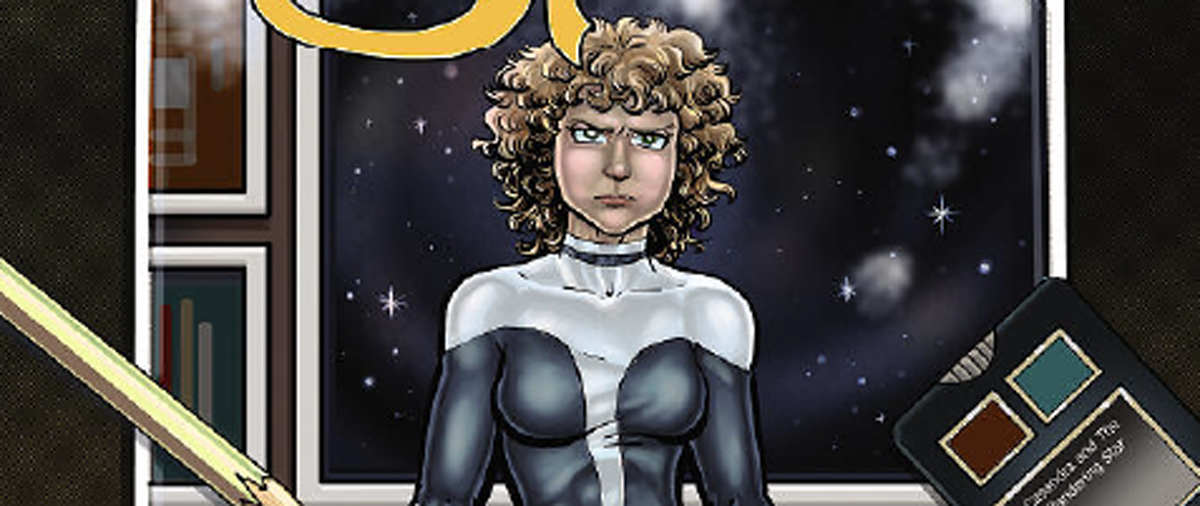
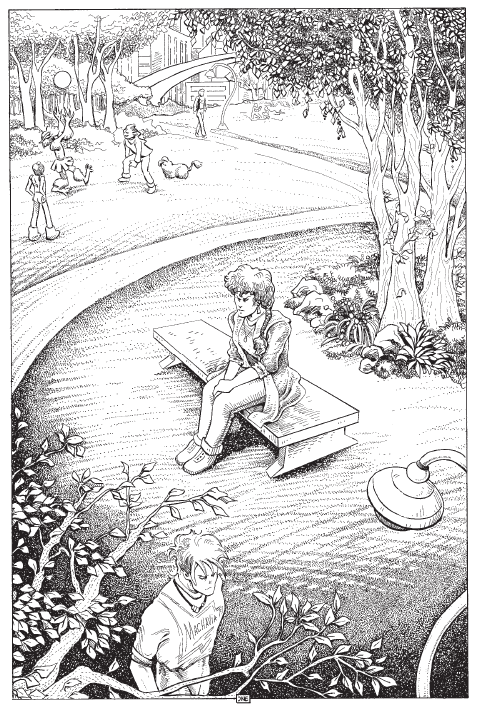
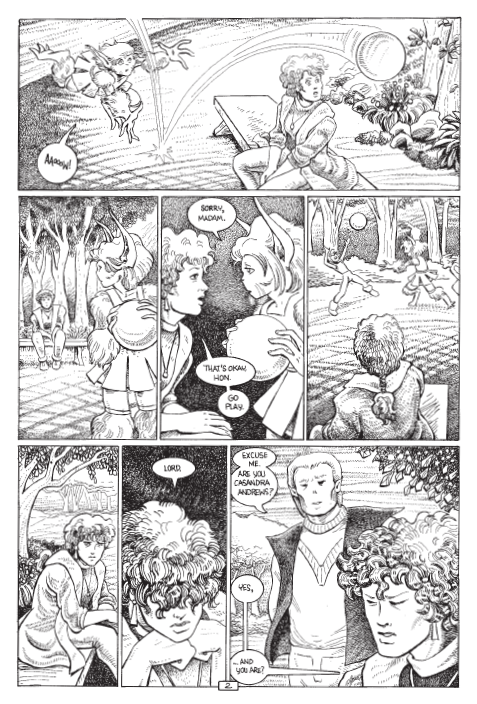
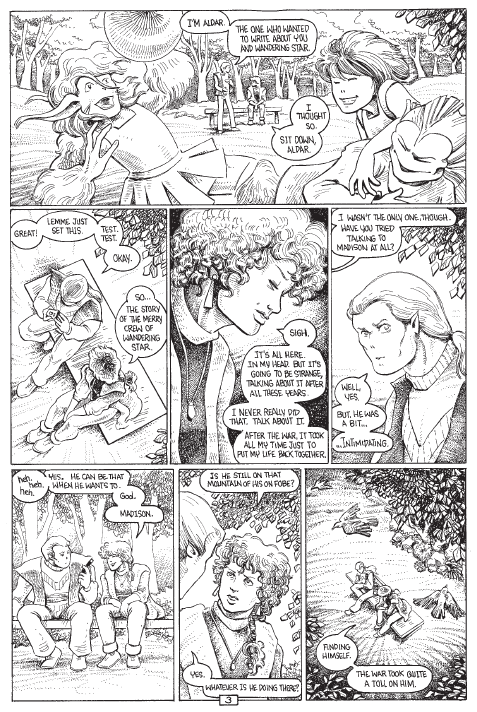
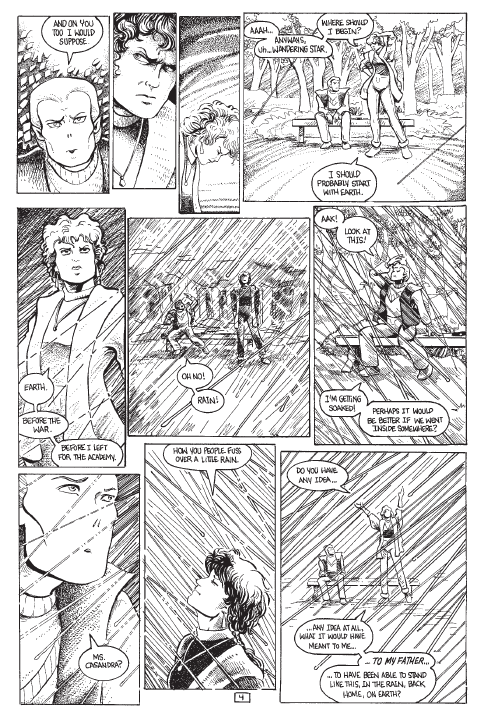
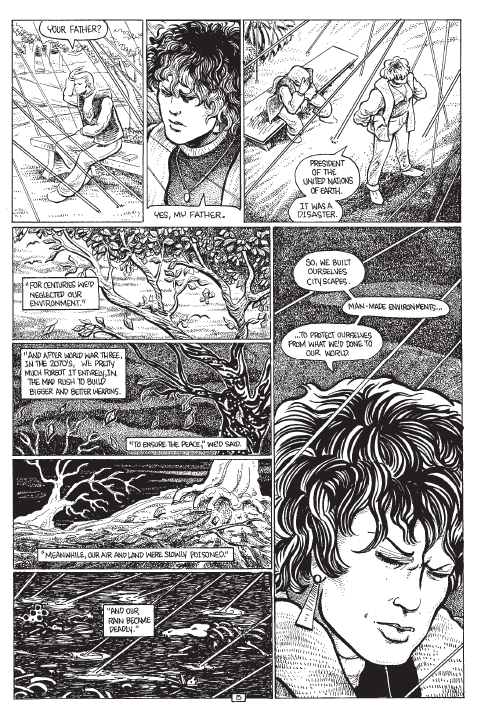
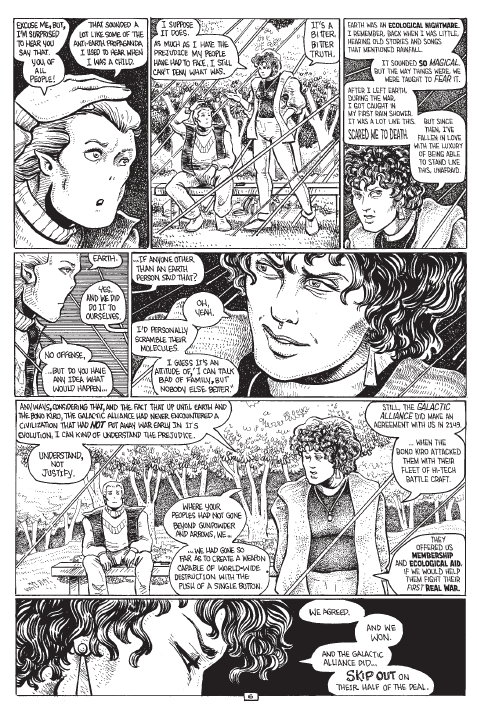

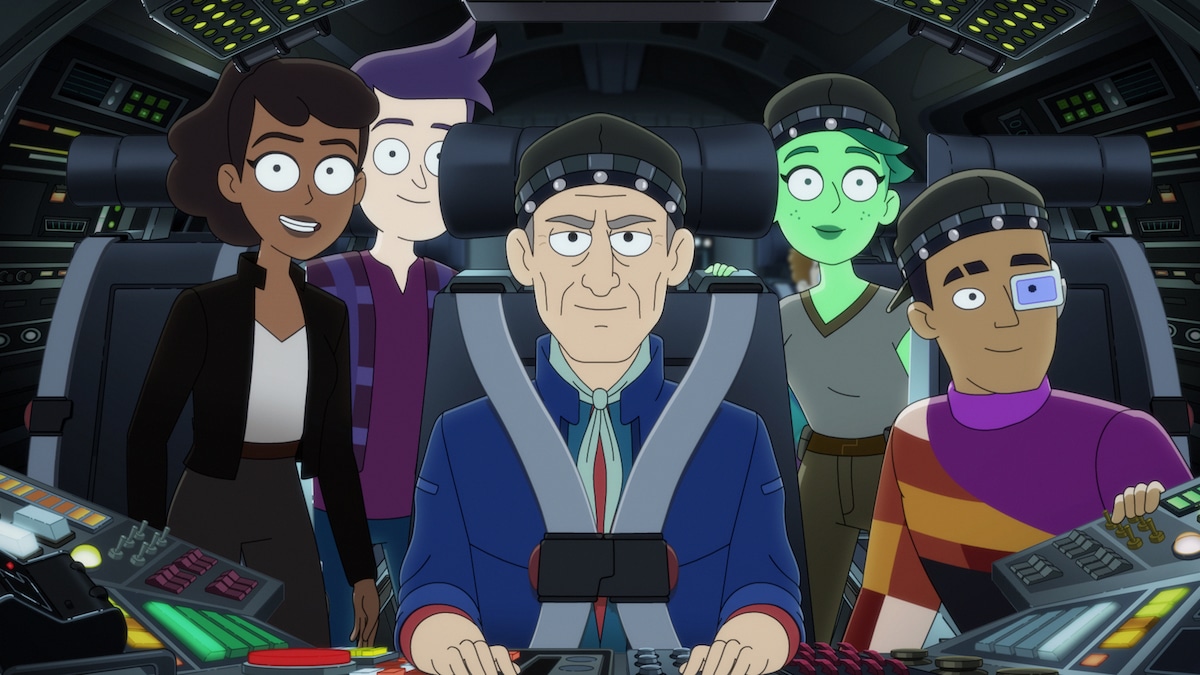
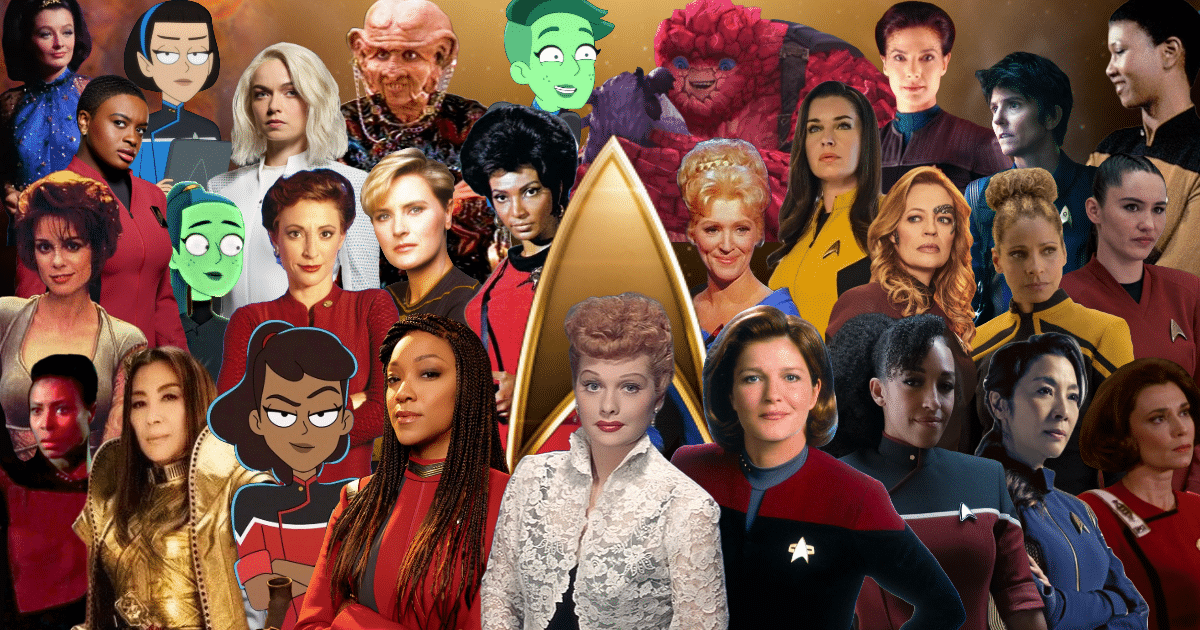


They say that a story is as good as its villain, but most villains are just that.
WANDERING STAR’s opponent, Narz, is more of an adversary. He’s got real motives and a moral code, just alien ones. Not unlike the antagonists in BLADE RUNNER, SEVEN, and THE MATRIX — or a lot of wicked politicians, heh.
– “Casandra is dealing with being her father’s daughter”
And also, I think, with being treated almost as her enemy’s rebel daughter? (Though, unlike Roman emperors adopting their intended successor, Narz only seemed to groom her as a worthy opponent.)
– “Coming from the desert, as I did, twelve feet of rain a year was initially daunting.”
“Come on, Casi! How many humans can say that they danced in the rain?”
– And what to read next? Maybe:
* Classics such as McCloud’s ZOT and McNeil’s FINDER.
* Recent books such as Soule’s LETTER 44 and Graham’s PROPHET.
* Ecological fables such as THE PUMA BLUES and SURFACE TENSION?
* Or, for daugther PTSD nonfiction, Bechdel’s FUN HOME and Tyler’s SOLDIER’S HEART?
A tip of the Steedian bowler to Teri Wood — her “Cartoonist” and my comics reviews appeared together in AMAZING HEROES for a time, and I followed WANDERING STAR with delight at seeing her tackle — and succeed in pulling off — such an ambitious project, such a well-wrought comics story. Here’s hoping the OMNIBUS re-release racks up big sales and a fresh new audience — if this were an AMAZING HEROES review, I’d certainly give WANDERING STAR my “!!!!!” recommendation.
Comments are closed.